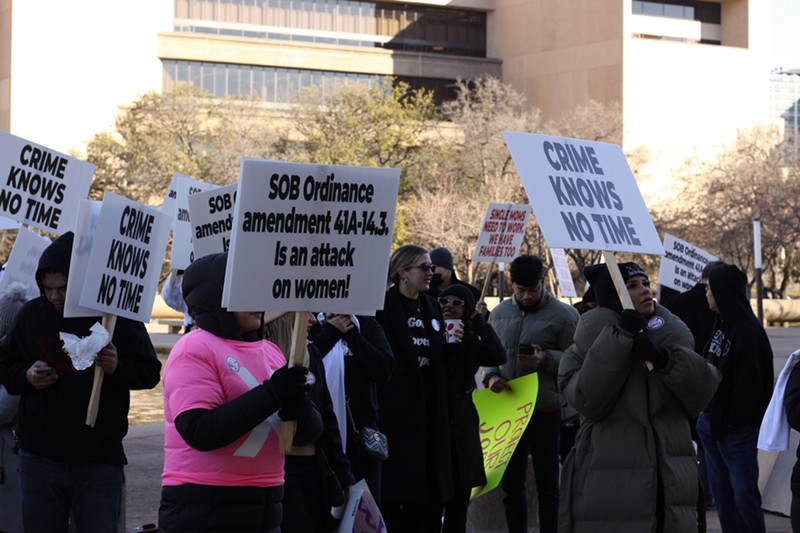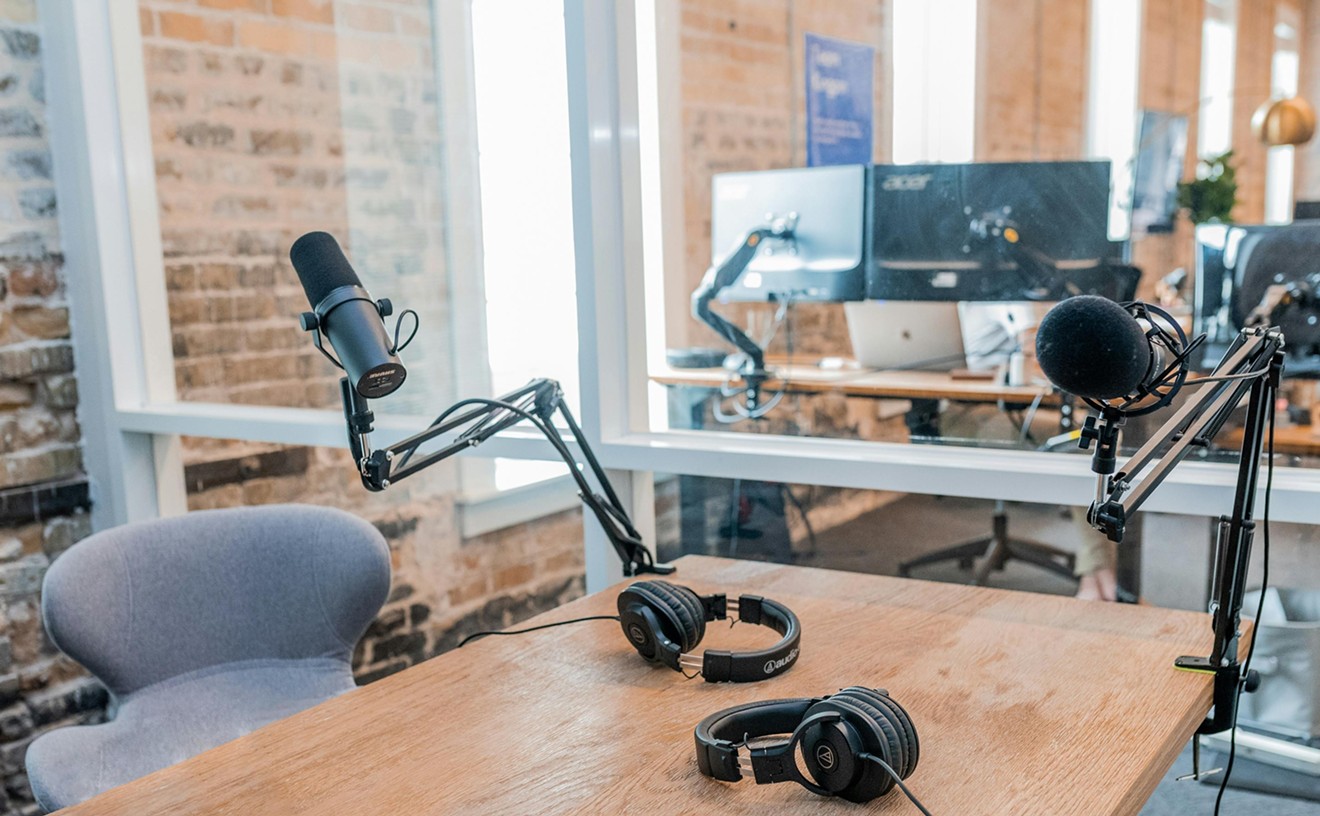"Crime knows no time," they chanted. Some held up placards that said slashing the hours was an "attack on women."
The Dallas Police Department and several members of the Dallas City Council had been pushing for new hours of operation that would see the businesses closed between 2 a.m. and 6 a.m.
But it didn’t matter how loud those gathered outside City Hall chanted or what their signs said. The City Council unanimously approved the new restrictions just hours later.
Ahead of the meeting, the protesters made their way through a security screening to get inside City Hall and heard discussions about the proposed change. Officers at the security screening at one point said there wasn’t anymore room in the council chambers for everyone waiting to get in. Some were directed to a small auditorium in the building where they could watch a live-feed of the meeting.
There were 50 registered speakers. Those who spoke in favor of the change said it would reduce violent crime in the city and help law enforcement better use its resources. DPD and City Council members who backed the proposal made similar arguments.
Some who opposed the new restriction work in the industry and said their hours and income would be slashed.
The City Council and DPD have been considering the change since November, when it was first proposed to the Quality of Life, Arts and Culture Committee.
In response to employee concerns about cut hours, City Council member Jaynie Schultz asked what types of services Dallas could provide to those affected by the code change. City staff said they would help them seek employment and skills development through its Small Business Center and other departments.
City Council member Omar Narvaez’s district is home to a majority of Dallas’ sexually oriented businesses. He said he has some issues with how this made its way to City Council, explaining that he felt it was rushed. “When we rush policy, we get bad policy,” Narvaez said.“At 2 a.m., the party’s over. That’s what we’re saying.” – Dallas Mayor Eric Johnson
tweet this
The Quality of Life, Arts and Culture Committee initially voted to have DPD form a task force to look into the clubs and come back in six months with more recommendations and data. But then the proposal went to the Public Safety Committee, which decided to send it to full council. After the full council was briefed on the proposed change, Mayor Eric Johnson had it placed on their voting agenda for this week.
“We’re going to pass this, and I’m going to apologize to all the industry workers here because I didn’t do enough,” Narvaez said.
He said the process was flawed and that this change won’t stop crime in the city. “I think that we have lost our way on this as a council,” he said. “This is the first time I sat back and gave up because the issue became so politicized.”
The crowd at City Hall applauded as Narvaez finished speaking.
City Council member Adam Bazaldua said, “This is hopefully going to provide a better quality of life."
He didn’t think the process was rushed or inadequate. He said it has been a robust policy discussion and that it has nothing to do with the kind of work being done at the clubs. To him, it’s about the data, which DPD says shows crime is higher around sexually oriented businesses during those early-morning hours.
“Sometimes sausage making isn’t so pretty,” Bazaldua said, arguing that the data shows people’s lives are at risk and restricting the hours of operation at sexually oriented businesses is the way to respond.
City Council member Gay Willis said she’s gotten emails from residents in her district complaining about shootings and other criminal activity they say come from sexually oriented businesses. She said DPD is having to waste resources policing these businesses from 2 a.m. until 6 a.m. when they could be doing something else. “We are hemorrhaging these DPD man hours,” Willis said.
City Council member Paul Ridley said an inordinate amount of resources is being used to police the areas around these businesses, and this isn’t moral policing.
City Council member Paula Blackmon said she went on a ride along with DPD to observe some of these establishments. On the tour, she said she saw legitimate businesses and she appreciates that. Still, she feels they should listen to the chief when he says this will reduce crime. “I feel it will work,” Blackmon said.“When we rush policy, we get bad policy.” – Omar Narvaez, Dallas City Council
tweet this
City Council member Chad West said he wants to support the police chief and DPD in their efforts to fight crime, but he also disapproved of the process, saying it was rushed. Nor did he like the idea that sexually oriented businesses that didn’t pose a crime problem would also have to shut down during the four-hour window.
West recommended some kind of appeal process for the businesses. He asked Garcia what criteria the department might consider for an appeal process that would allow the businesses to reopen from 2 a.m. until 6 a.m.
Garcia said he wouldn’t support an appeal process and didn’t have any criteria to recommend. Regardless of whether a specific sexually oriented business is causing problems, Garcia said they should be shut down because of problems at other locations.
The City Attorney wouldn’t provide any recommendations either. So, West went ahead and moved to add an appeal process to the ordinance, getting support from Narvaez. That motion failed.
Narvaez later moved to have the ordinance reviewed by the City Council every two years, something the council has done increasingly with other ordinances. That motion passed.
What it came to a final vote, the council’s decision was unanimous.
Johnson said he feels for the employees who will be financially harmed and will be speaking with the city’s experts to discuss the employment issues.
But he said none of the other work the council does matters if people aren’t safe. “We have a solution that’s in front of us today. It’s a simple solution,” Johnson said. “At 2 a.m., the party’s over. That’s what we’re saying.”
The new rules go into effect immediately. Violators of the new hours of operation could have their licenses suspended for 30 days, be fined up to $4,000 and face up to a year in jail.












